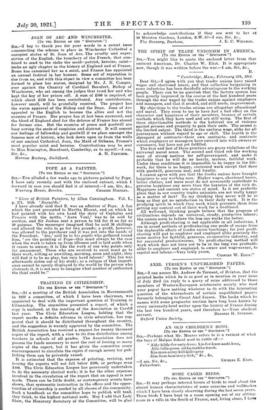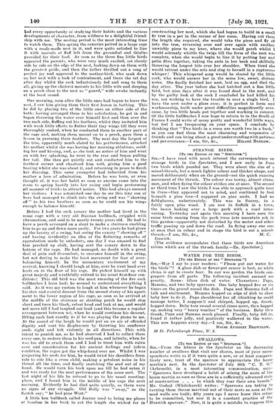SOME CAGED BIRDS.
[To THE EDITOR OF THE " SPLCIATOL."1 Sin,—It may perhaps interest lovers of birds to read about the almost human characteristics of some eanariee and bullfinches which I have been closely observing during the last seven years. These birds I have kept in a room opening out of my sitting- room in a villa in the South of France, and, living alone, I have had every opportunity of studying their habits and the various developments of character, from wildness to a delightful friend- ship with me. The nesting period is the most interesting time to watch them. This spring the canaries paired in a large cage with a ready-made nest in it, and were quite satisfied to line It with morsels of fluff left from the groundsel and thistles provided for their food. As soon as the three fine little birds appeared the parents, who were very much excited, sat closely side by side on the edge of the nest, looking down on them with the greatest pride, and then the father thrilled out a song of perfect joy and approval to the mother-bird, who sank down on her nest with a look of contentment, and there she sat day after day whilst the cock industriously fed and sang to them all, giving up the choicest morsels to his little wife and sleeping on a perch close to the nest as " guard," wide awake instantly at the least sound.
One morning, soon after the little ones had begun to leave the nest, I saw him giving thorn their first lesson in bathing. This lie did by placing two of the little ones on either side of the bath; having arranged them to his satisfaction, he got in and began throwing the water over himself first and then over the two each side, puffing out his feathers, whilst they imitated him with weak little efforts to flutter their tiny wings till they were thoroughly soaked, when he conducted them to another part of the cage and, making them mount on to a perch, gave them a lesson in preening their feathers. The next day the largest of the trio, apparently much elated by his performance, attacked his mother whilst she was having her morning ablutions, scold- ing her and hissing, and, as she took no notice of him and went on with her splashing, he went to the rear and began pulling her tail. She then got quietly out and conducted him to the farthest corner and chastised him well, giving him a good beating whilst she was about it, and returning in peace to finish her dressing. This same youngster had inherited from his mother a love of admiration. Before he was born, or even thought of, it was her habit as soon as anyone came into the room to spring hastily into her swing and begin performing all manner of tricks to attract notice. This had always amused her visitors. I was astonished one day to see this tiny son of hers had managed to climb into the swing and was "showing off" to his two brothers as soon as he could use his wings enough to balance himself.
Before I had the cock canary the mother had lived in the same cage with a very old Russian bullfinch, crippled with rheumatism, and said to be nearly twenty years old. He had to have a perch arranged on a slant to make a staircase enabling him to go up and down more easily. For two years he bad given up the luxury of a swing, but seeing the canary " showing off" and having (evidently) an idea of the flattering remarks of approbation made by onlookers, one day I was amazed to find him perched up aloft, having sent the canary down to the bottom of the cage. He had managed, no doubt with a great deal of pain and discomfort, to ensconce himself in the swing, but not daring to make the least movement for fear of over- balancing himself. In the momentary excitement of my arrival, knowing I should laugh at him, over he went head over heels on to the floor of his cage. He picked himself up with great majesty and wrathfully retired to his usual first-floor con- ditions! This old bird was the most amusing of the five cock bullfinches I have had; he seemed to understand everything I said. As it was my custom to laugh at him whenever he began his slow and careful descent from the second storey of his apart- ment to the lower region of his cage, as soon as he arrived at the middle of the staircase or slanting perch he would stop short and turn his black, velvet head and look at me, and would not move till I had laughed out loud (and this became a regular arrangement between us), when he would continue his descent, lifting each foot exactly as if he was playing the piano to me. At the sound of the laugh he would put on an air of offended dignity and vent his displeasure by throwing his sunflower seeds right and left violently in all directions. This with intent to punish me, as he had observed I had to collect them every one, to restore them to his seed-pan, and latterly, when he was too old to crack them and I had to treat him with extra care and consideration for his ancient feelings and infirm condition, the rogue got the whip-hand over me. Whilst I was preparing his seeds for him, he would twist his shoulders from side to side like a cross child, making a petulant noise in his throat all the time, and finally snatching the seed out of my hand, lie would turn his back upon me till he had eaten it and was ready for the next performance of the same sort. The last night of his life he refused to go to his usual roosting- place, and I found him in the middle of his cage the next morning. Evidently he had died quite quietly, as there were RO signs of any struggle. Old Bully was " away," as the Scotch say; "he had gone West."
A little hen bullfinch called Jeanne used -to bring me -pieces of bamboo in her beak to cut the length she wished -for in
constructing her nest, which she had begun to build in a small fir tree in a pot in the corner of her room. Having cut them the length she required, she would take the piece and fly off into the tree, returning over and over again with another unwieldy piece to my knee, where she would perch whilst I would solemnly whittle the twigs till the form of the nest was complete, when she would begin to line it by putting hay and palm fibre together, taking the ends in her beak and skilfully throwing the longest bits over her shoulder. When tired she would retreat under the sofa and sing to herself in a rapturous whisper! This whispered song would be shared by the little cock, who would answer her in the same low, sweet, distant notes. She finally finished her nest, laid an egg, and died the day after. The year before she had hatched out a fine little bird, but nine days after it was found dead in the nest, and by the guilty look of the cock I concluded he had killed his son, not wishing to have the trouble to rear a single bird. I have the nest under a glass case; it is perfect in form and workmanship, built under great difficulties magnificently over- come, by two little heads put together and working in concert. Of the little bullfinches I now hope to return to in the South of France I could write of many pretty and wonderful little ways, but feel I am trespassing on your space. I conclude by thinking that "Two birds in a room are worth two in a bush," as you can find them the most charming and responsive of friends and can bring about a great understandingwith patience and perseverance.—I am, Sir, &c., HILARE Barttow.



































 Previous page
Previous page